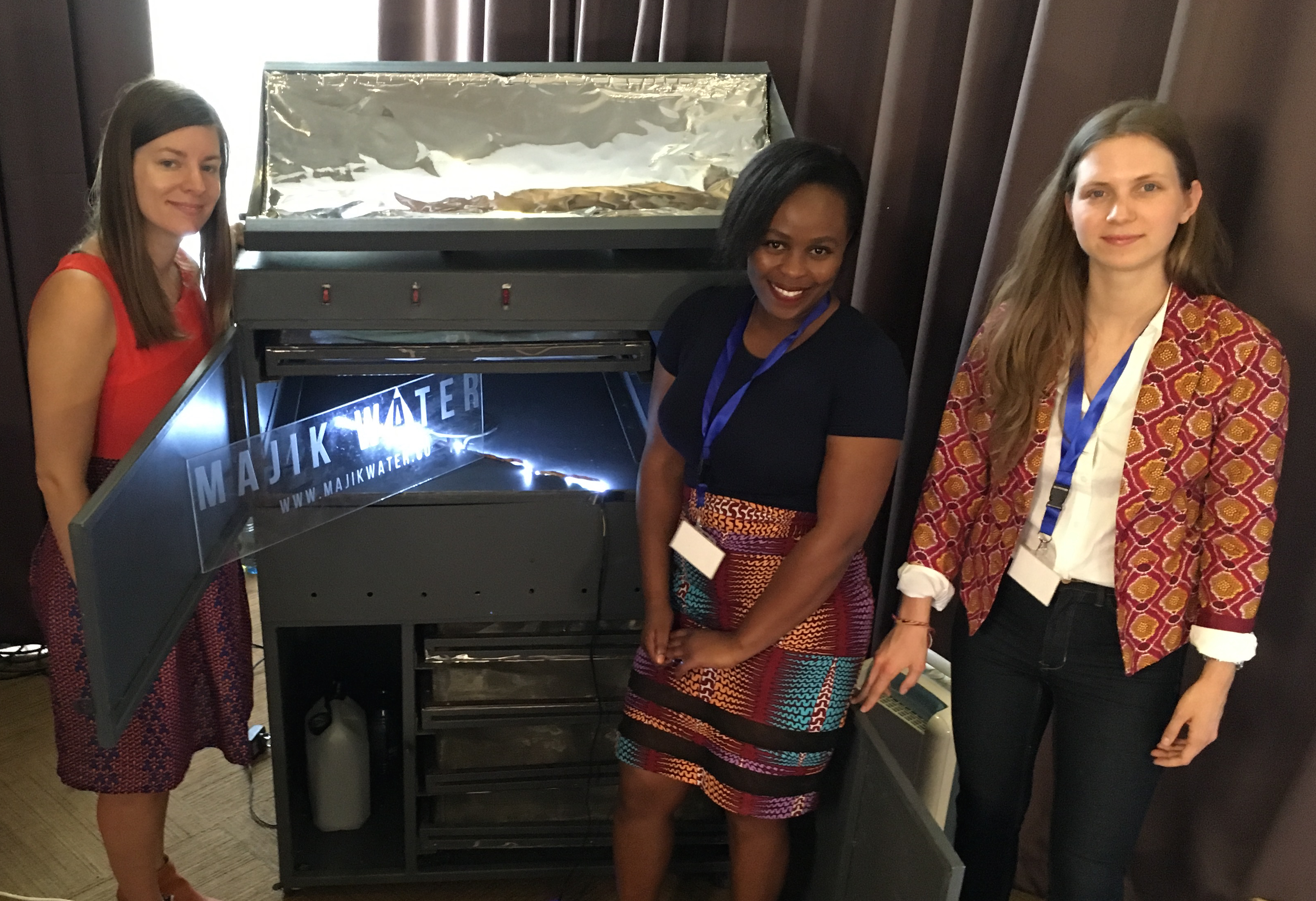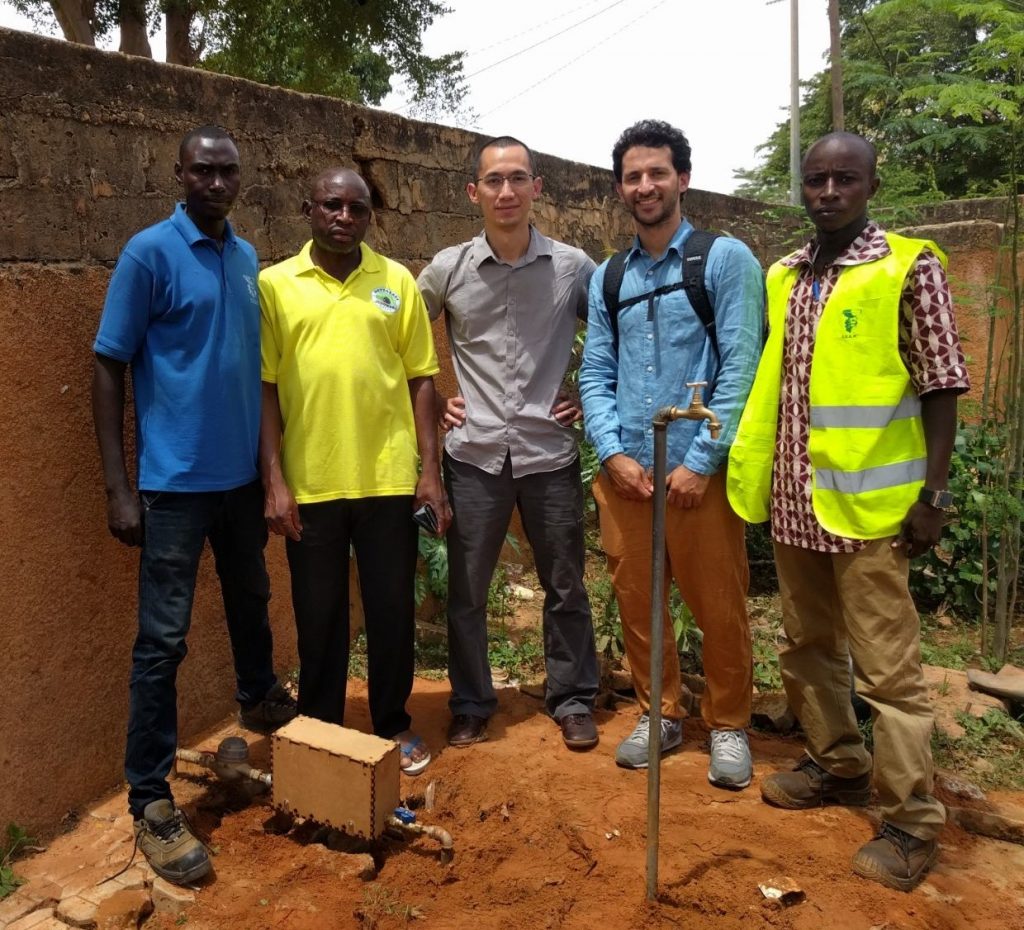The post Start-up produces clean water from thin air appeared first on The Source.
]]>Majik Water aims to serve rural and urban populations, mainly in Kenya, where increasing water scarcity poses a serious threat to communities. The device utilises hydrophilic materials to adsorb water from the atmosphere which, when subjected to heat and filtration, produces a plentiful supply of clean drinking water. With a target selling price of 1 cent per litre, it can be used to serve communities in the lowest income bracket.
“Where we’re operating, the air is lacking in humidity. To design for that we use desiccants – water loving materials. The best place you’d find those is if you buy a new pair of shoes or a bag, and there’s a tiny packet of clear balls,” Anastasia Kaschenko, Majik Water’s CTO, told The Source.
“That’s silica, and a variation of that is the exact desiccant we use in our prototyping now. The reason we use that is because it’s abundantly available, it’s cheap and it’s non-toxic.”
Kaschenko believes democratisation of water is key to the Majik Water project and has the potential to rid the Kenyan water market of illegal actors who exploit scarcity by selling untested water.
“There are informal players, such as the water mafia and resellers. Individuals or groups that are selling supposedly clean drinking water, but this water is both untested and the quality is unverified.”
The trio met in Silicon Valley in August 2017 during an entrepreneurial programme, which tasked participants with conceiving an idea that could impact one billion people in 10 years. Beth Koigi, its CEO, had been running a successful Kenyan water filtration company for five years before but faced challenges due to decreasing water tables.

“Filtration becomes irrelevant when there isn’t anything to filter. That was at the front of her mind when she came to California. She’d heard my team at the time was working on dew harvesting, and so she approached me and asked if it was possible in dry and very arid areas,” said Kaschenko.
“That was how we started looking into that technology and that space. We are three women, from three different continents, in a place none of us had been prior to meeting.”
Although Majik Water is still in its prototyping stage in Kenya, the company has international ambitions and is aiming to serve 70,000 people each day by 2022. If their target is met, the entrepreneurs will consider widening their reach to East Africa, although Kaschenko said the product has garnered global interest.
“We’ve actually received interest from places like Qatar, South Africa and southern India where understandably it is quite dry as well. We’re very open to that and that’s in our long-term plan for sure.”
The post Start-up produces clean water from thin air appeared first on The Source.
]]>The post How a new prepayment system is connecting piped water to the urban poor appeared first on The Source.
]]>How does it work?
CityTaps has developed an innovative solution, CTSuite, that bridges the gap between water utilities and the urban poor: it is a prepayment service that comprises the world’s only smart (IoT) and prepaid water meter and a billing software. CTSuite allows residents to prepay for running water in the home–which is cheaper, healthier, and more convenient than any alternative–with any mobile phone, at any time, and for any amount. Prepaid water helps utilities become financially more viable, and gives them the ability to expand at-home water service to even the poorest residents and invest in infrastructure development.
How did the CityTaps project come about?
While working in Kampala, Uganda, I saw first-hand how the lack of piped-water deeply impacts the urban poor in the developing world. Nearly one billion people live without access to water in the home and face a triple tax in health (jerricans contaminate clean water), in money (up to 20 times more than the regulated tariffs), and in time (up to two hours per day). Women and girls disproportionately bear this burden. As a feminist and humanist, I have dedicated my career to trying to address this challenge through the founding of CityTaps in 2015. We have a moral imperative to solve this problem that affects the dignity, economic opportunity, and health of millions. Nobody’s yet cracked this–I believe that we have a major piece of the puzzle.
Is it still at the pilot stage or is it operational in cities?
CTSuite has been under field test since October 2016 in Niamey, Niger, with Veolia, the world’s largest water utility company. Twenty plots comprising 51 households are receiving prepaid water at home and accruing significant social benefits. Based on this success, CTSuite has gathered serious interest from private and public water utility companies throughout Africa, South America, and South Asia. We plan a 1,300 plus unit rollout in winter 2017 in Niger.
What has been the feedback from users?
We conducted surveys before, during and after our pilot in Niamey. Respondents reported that they:
- Saved money (a 94 percent saving based on median consumption of subscribers paying 16 times the utility tariff)
- Had greater control over their finances (households reported having a water budget increase from 35 percent to 68 percent over the course of the project, proving that prepayments are easier to manage),
- Experienced improved health outcomes (61 percent of respondents reported an improved perception of health), and
- Reaped savings in time otherwise spent procuring water from alternative sources or making time-consuming payments in person at the water utility (women and girls in particular reported benefits from this service as they are primarily responsible for water duties in the household).
- Overwhelming customer satisfaction was reported and 98 percent of respondents would recommend CTSuite to a neighbour. We will be expanding the service with the water utility (SEEN) as they can see the operational and financial benefits that CTSuite brings to them.

How is it financed and how is the user cost calculated?
CityTaps employs a meter-as-a-service model. Our unique customer management system supports the utility’s water monitoring and revenue collection processes. CityTaps is also responsible for collecting mobile payments from end-users via our platform. From these funds, CityTaps shares revenues with the water utility–we get paid when the utility gets paid, which is when people have water at home. As a startup, we are financed by grants, competitions, and some equity investors.
Who do you partner with?
We partner with water utilities to help them improve their cash flows and balance sheets. With CityTaps, utilities can serve all their customers more efficiently, expand coverage, and access new sources of financing for their capital projects. Our system helps utilities become financially independent and able to invest in infrastructure for at-home water service to even the poorest residents.
What is the potential for CityTaps in developing cities around the world, are there any prerequisites?
Scaling our solution requires deployment in the growing urban centre of the developing world. While in dire need of innovation, this industry can be slower than most to adopt new technology. Our main challenge is proving the value to the utilities. The only prerequisite is a utility interested in improving and expanding its service.
Can CityTaps only be achieved due to the technology available to us today, like the cloud, mobile phones and IoT?
CityTaps’ solution, CTSuite, offers the world’s only smart and prepaid water meter system that fully automates a water utility’s metering and payment processes. As such, CTSuite is dependent on technologies available to us today in order to offer a pay-as-you-go (PAYG) at-home water service using mobile money integrated with prepaid smart meters (CTMeter) and a companion software management system (CTCloud). We leverage the power of the IoT, hardware sensors, mobile phones (smartphones not required), and cloud-based software–all adapted for use in the developing world–to create the largest social impact possible. The CTSuite allows the utility to track customer behaviour and gain new insights from big data analysis and visualisation not otherwise available in customer management systems.
Where do you see CityTaps in five years’ time?
Based on the success of our pilot in Niamey, CTSuite has gathered serious interest from private and public water utility companies in sub-Saharan Africa and the developing world. We plan to deploy 2,000 to 3,000 CTSuites over the next 12 months, on our way to 100,000 in four years and 10 million in 10 years. CityTaps’ innovative solution has the potential to dramatically and quantifiably improve the lives and well-being of a billion people who do not have access to water in the home. It is our goal to work together with water utilities, impact investors, municipalities, and international financial institutions to make access to running water in every urban home a reality.
The post How a new prepayment system is connecting piped water to the urban poor appeared first on The Source.
]]>